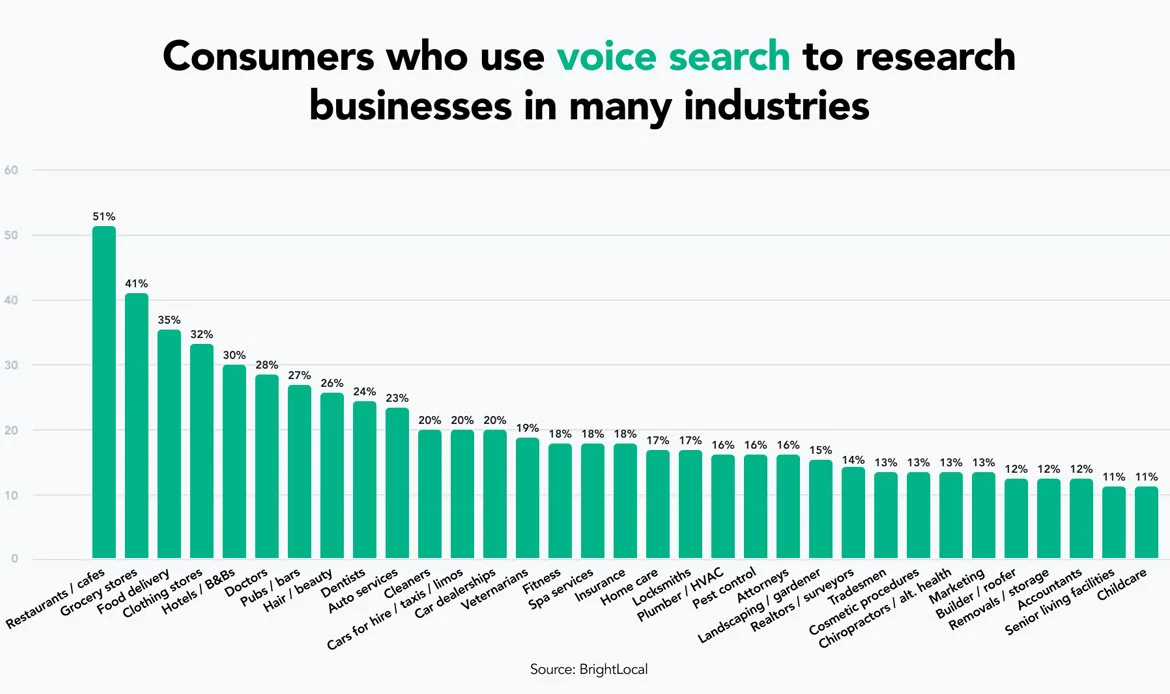Let’s delve into the world of voice search optimization, where innovation and adaptation pave the way for a new era of SEO success.
In an era where technology is advancing at an unprecedented pace, the way we search for information is rapidly evolving. Gone are the days of typing rigid keywords into search engines; the future of search lies in the power of our voices. Voice search, powered by cutting-edge natural language processing and artificial intelligence, has emerged as a transformative force in the digital realm. As virtual assistants like Siri, Alexa, and Google Assistant become our trusted companions, voice search enhancement has become an indispensable aspect of SEO success.
Picture a world where you can effortlessly interact with devices, conduct searches, and access information, all through the simple act of speaking. Voice search has not only revolutionized the way we find answers but has also reshaped the landscape for businesses and marketers. In this blog, we will explore the profound impact of voice search on SEO strategies and unveil the key to unlocking unparalleled success in the future – Voice Recognition Search Optimization.
What is Voice Search Optimization?
Voice Recognition Search Optimization is the process of optimizing digital content and website elements to improve visibility and relevance in voice search results. With the increasing popularity of voice-activated virtual assistants like Siri, Alexa, and Google Assistant, voice search has transformed the way people interact with search engines.
Unlike traditional text-based search, voice search queries are more conversational and resemble natural language questions. Voice Recognition Search Optimization involves targeting long-tail keywords, providing direct answers to common questions, optimizing for featured snippets, and using structured data to enhance content understanding by search engines.
By tailoring their websites for voice search, businesses can improve their online visibility, user experience, and overall SEO performance, ensuring they remain competitive in the rapidly evolving digital landscape.
Understanding Voice Search: The Evolution of Search Technology
Before diving into the world of Voice Search Optimization, it’s essential to understand the evolution of search technology. Traditional search involved typing keywords into a search engine to find relevant information. However, voice search revolutionized the process by allowing users to speak their queries naturally. This shift has been fueled by the advancements in natural language processing (NLP) and artificial intelligence (AI) that enable virtual assistants to comprehend and respond to human speech accurately.
The Rise of Voice Search: Key Statistics
To comprehend the significance of voice search, let’s look at some eye-opening statistics:
- According to ComScore, 50% of all searches will be voice-based by 2023.
- A survey by PwC indicates that 65% of 25-49-year-olds speak to their voice-enabled devices at least once a day.
- Voicebot.ai reported that there were over 4.2 billion voice assistants in use globally as of 2022.
- Google claims that 27% of the global online population uses voice search on mobile.
- The number of voice search queries for local information is growing 35 times faster than text searches (Google).
The Impact of Voice Search on SEO
As voice search gains prominence, it significantly impacts search engine optimization strategies. To maintain a competitive edge, businesses must grasp the following key implications of voice search on SEO:
Long-tail Keywords and Conversational Phrases
Voice search queries tend to be more conversational and longer than traditional text searches. Hence, optimizing content with long-tail keywords and natural language is essential to capture voice search traffic.
Featured Snippets and Position Zero
Virtual assistants often read out featured snippets as answers to voice queries. Therefore, securing the coveted “position zero” in search results becomes paramount for Voice Recognition Search Optimization.
Local SEO and “Near Me” Queries:
Voice search is highly popular for local searches, such as finding nearby restaurants or stores. Businesses must optimize their local SEO to appear in voice search results for “near me” queries.
Mobile Responsiveness
The majority of voice searches occur on mobile devices. Having a mobile-responsive website is crucial for catering to voice search users and improving overall user experience.
Voice Search Optimization Strategies for SEO Success
Now that we understand the impact of voice search on SEO, let’s delve into actionable strategies for Voice Recognition Search Optimization:
Conversational Content
Conversational Content refers to the practice of creating digital content that aligns with natural language and encourages a direct, engaging conversation with the audience. Craft content in a conversational tone, anticipating how users might frame voice search queries. Address common questions and provide direct answers to capture voice search traffic. As voice search queries become more conversational, adapting website content to this style is vital for effective Voice Recognition Search Optimization.
By crafting content that addresses user questions and concerns in a friendly, approachable manner, businesses can enhance user satisfaction and establish themselves as reliable sources of information. Anticipating common voice search queries related to their niche enables businesses to provide direct answers, increasing the likelihood of their website being featured in voice search results.
Through the integration of conversational content, businesses can not only improve their voice search rankings but also enhance the overall user experience, fostering stronger connections with their audience. This strategic approach drives higher engagement, loyalty, and ultimately, SEO success in the voice-driven era.
Target long-tail and question keywords
Conduct extensive research to identify relevant long-tail keywords and phrases that align with your target audience’s voice search behavior. Tools like Google’s Keyword Planner and Answer the Public can be valuable resources.
Question Keywords and long-tail keywords are essential components of Voice Recognition Search Optimization. Voice search queries differ from traditional text-based searches in that they are more conversational and often resemble natural language questions. When users interact with voice-activated virtual assistants like Siri, Alexa, or Google Assistant, they tend to ask questions in a more human-like way.
Question Keywords: These are keywords that mirror the specific questions users may ask during voice search. For example, instead of typing “best restaurants in New York” into a search engine, a voice search user might say, “What are the best restaurants in New York?” Incorporating question keywords into your content helps your website appear as a relevant result when users ask similar questions.
Long-Tail Keywords: Long-tail keywords are longer and more specific keyword phrases. They often contain three or more words and are highly targeted to a particular niche or topic. Voice search queries are more likely to be longer and more detailed. By targeting relevant long-tail keywords, you increase the chances of your content matching the natural language used in voice search queries.
Schema Markup Implementation
Schema markup is a structured data format that provides search engines with additional context about the content on your website. Utilize schema markup to provide structured data that helps search engines better understand your content. This can enhance the likelihood of your content being featured in voice search results.
When users perform voice searches, virtual assistants rely on structured data to understand and deliver relevant results effectively. By implementing schema markup, businesses can provide clear and concise information about their content, making it easier for search engines to interpret and feature in voice search results.
With schema markup, you can highlight key elements like product details, events, reviews, and FAQs, increasing the likelihood of your website being selected as a featured snippet or direct answer in voice search queries.
Incorporating schema markup is a strategic approach that not only improves voice search rankings but also enhances the overall user experience. By enabling virtual assistants to comprehend your content better, you position your website for success in the dynamic and voice-driven world of SEO.
Pay Special Attention to Local SEO
Local SEO focuses on improving your online presence and visibility for location-based searches, making it essential for businesses targeting local customers. As voice search increasingly caters to local queries, paying special attention to Local SEO ensures that your business appears prominently in voice search results when users ask for nearby products, services, or information.
To enhance your Local SEO efforts, claim and optimize your Google My Business listing, ensure accurate and consistent business information across directories, and use location-specific keywords in your content. These strategies not only improve your voice search rankings but also drive more foot traffic and conversions from local customers.
By giving priority to Local SEO, you position your business for success in the voice-driven future, effectively connecting with your local audience and gaining a competitive edge in the dynamic world of voice search enhancement.
Make sure your website loads fast
Ensure your website loads quickly on both desktop and mobile devices. Voice search users seek immediate answers, and a fast-loading site can significantly improve user satisfaction.
With voice search becoming increasingly prevalent, search engines prioritize websites that load swiftly, especially on mobile devices. Websites that load slowly risk losing potential visitors and may experience lower search engine rankings.
To optimize your website for voice search success, focus on website performance enhancements. Implement techniques like image optimization, browser caching, and minimizing HTTP requests to speed up your website’s loading times.
By making sure your website loads fast, you not only improve your voice search rankings but also create a positive impression on users. A responsive and speedy website not only attracts voice search traffic but also encourages user engagement and boosts overall SEO success in the voice-driven era.
Create FAQ Pages
FAQ pages serve as a valuable resource for voice search users, who often seek direct answers to their queries. By anticipating common questions related to your industry or niche, and providing clear and concise answers on your FAQ page, you increase the likelihood of your website being featured as a direct answer in voice search results.
When virtual assistants respond to voice queries, they often draw information from well-structured FAQ pages that align with user intent. By creating comprehensive and conversational FAQ content, you not only cater to voice search users but also enhance your website’s overall user experience.
Through the implementation of FAQ pages, you position your brand as an authoritative source and drive higher user engagement. Develop comprehensive FAQ pages that address common queries related to your industry or niche. This will increase the likelihood of your content being used as a direct answer in voice search results.
Voice Search and User Experience
Voice search has revolutionized how users interact with technology, making user experience a key factor in SEO success. Users of Voice search expect seamless and efficient interactions with virtual assistants. Websites that prioritize user-friendly interfaces, responsive designs, and fast loading times are more likely to satisfy these user expectations and rank higher in voice search results.
Optimizing your website for voice search not only improves SEO rankings but also enhances overall user engagement. By providing direct and accurate answers to voice queries, you foster trust and loyalty among users, encouraging them to explore more of your content.
A positive user experience not only attracts voice search traffic but also influences user behavior, leading to increased conversions and long-term brand loyalty. In the dynamic world of voice search Enhancement, prioritizing user experience is a pathway to SEO success and sustainable growth for your business.
Beyond SEO benefits, Voice Recognition Search Optimization also improves the overall user experience. Voice search allows users to interact with technology more naturally and effortlessly. Embracing this technology can lead to:
Increased User Engagement
Voice search delivers direct and informative answers, fostering a conversational experience that enhances user satisfaction. By tailoring your content to align with natural language queries, you capture the attention of voice search users, leading to increased interaction and prolonged website visits. By providing accurate and concise answers, businesses can engage users effectively and encourage them to explore further.
Brand Loyalty
Delivering valuable and reliable information through voice search can foster trust and loyalty among users, converting them into repeat customers.
When users consistently find valuable and reliable information on your website through voice search, it fosters trust in your brand or business. Users perceive your website as an authoritative and knowledgeable source, which enhances your credibility and reputation.
As trust builds, users are more likely to become loyal to your brand. Repeat customers are those who have had positive experiences with your website and keep coming back for more. By consistently delivering valuable information through voice search, you can convert first-time users into loyal, repeat customers.
Enhanced Accessibility
Voice search makes digital content accessible to a broader audience, including those with visual or physical impairments. voice search enables a more inclusive user experience for people with physical disabilities, visual impairments, or those who struggle with traditional text-based interfaces.
For individuals with limited mobility or visual challenges, voice-activated virtual assistants serve as accessible gateways to the digital world. By simply using their voice, they can navigate websites, gather information, and interact with online content effortlessly.
Voice Recognition Search Optimization enables inclusivity, expanding possibilities for those facing challenges with traditional input methods.
Prioritizing voice search accessibility empowers all individuals to engage with digital content inclusively, fostering a diverse community.
Frequently Asked Questions About Voice Search Optimization
What is voice search optimization and why is it important?
Voice search optimization involves tailoring your website content to be easily discoverable via voice queries on devices like smartphones and smart speakers. It’s important because voice search is becoming increasingly popular, and optimizing for it can improve SEO visibility and user engagement.
How can I optimize my website for voice search?
To optimize for voice search, focus on using conversational, long-tail keywords, structured data (schema markup), fast-loading pages, and clear, concise answers to common questions. This ensures voice assistants can accurately retrieve and present your content to users.
Will voice search impact the future of SEO?
Yes, as more users rely on voice assistants, search engines will increasingly prioritize content that is optimized for natural language queries. Websites that adopt voice search optimization early will have a competitive advantage in rankings and user engagement.
Wrapping Up
In conclusion, optimizing voice search is not just a fleeting trend but a fundamental shift in the way we search for information. As virtual assistants become more sophisticated and prevalent, businesses must adapt their SEO strategies to cater to the rising wave of voice search users.
The future of SEO success lies in understanding and harnessing the power of voice search. By crafting conversational content, targeting long-tail keywords, and embracing structured data, businesses can secure a competitive edge in the voice-driven landscape.
Embrace the transformative potential of voice search, and be prepared to lead the way in the dynamic world of SEO. The future is voice-activated, and those who optimize for it today will reap the rewards tomorrow. So, get ready to speak your way to SEO success and unlock new possibilities for your brand in the exciting era of voice search Enhancement.
Future-Proof Your SEO with Voice Search Optimization
Voice search is changing how users interact with the web, making voice search optimization essential for modern SEO strategies. By using natural language, long-tail keywords, and structured content, your website can be easily found through voice assistants like Siri, Alexa, and Google Assistant.









